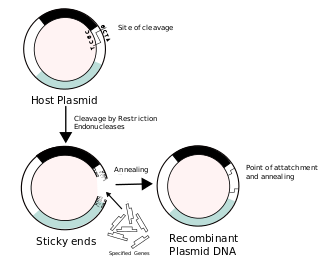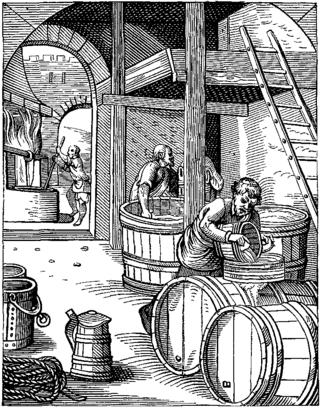Related Research Articles
Genentech, Inc. is an American biotechnology corporation headquartered in South San Francisco, California. It became an independent subsidiary of Roche in 2009. Genentech Research and Early Development operates as an independent center within Roche. Historically, the company is regarded as the world's first biotechnology company.

Herbert Wayne "Herb" Boyer is an American biotechnologist, researcher and entrepreneur in biotechnology. Along with Stanley N. Cohen and Paul Berg, he discovered a method to coax bacteria into producing foreign proteins, which aided in jump-starting the field of genetic engineering.

Somatostatin, also known as growth hormone-inhibiting hormone (GHIH) or by several other names, is a peptide hormone that regulates the endocrine system and affects neurotransmission and cell proliferation via interaction with G protein-coupled somatostatin receptors and inhibition of the release of numerous secondary hormones. Somatostatin inhibits insulin and glucagon secretion.

Amgen Inc. is an American multinational biopharmaceutical company headquartered in Thousand Oaks, California. One of the world's largest independent biotechnology companies, Amgen's Thousand Oaks staff in 2022 numbered approximately 5,000 and included hundreds of scientists, making Amgen the largest employer in Ventura County. As of 2022, Amgen has approximately 24,000 staff in total.

Recombinant DNA (rDNA) molecules are DNA molecules formed by laboratory methods of genetic recombination that bring together genetic material from multiple sources, creating sequences that would not otherwise be found in the genome.

John Shine is an Australian biochemist and molecular biologist. Shine and Lynn Dalgarno discovered a nucleotide sequence, called the Shine-Dalgarno sequence, necessary for the initiation of protein synthesis. He directed the Garvan Institute of Medical Research in Sydney from 1990 to 2011. From 2018 to 2022, Shine was President of the Australian Academy of Science.

Robert "Bob" Swanson (1947–1999) was an American venture capitalist who cofounded the biotechnology giant Genentech in 1976 with Herbert Boyer. Genentech is a pioneer in the field, and it remains one of the leading biotechnology companies in the world. He served as CEO of Genentech from 1976 to 1990, and as chairman from 1990 to 1996.
Fu-Kuen Lin is a mycological physiologist, nephrologist and hematologist.
This page provides an alphabetical list of articles and other pages about biotechnology.
Arthur Dale Riggs was an American geneticist who worked with Genentech to express the first artificial gene in bacteria. His work was critical to the modern biotechnology industry because it was the first use of molecular techniques in commercial production of drugs and enabled the large-scale manufacturing of protein drugs, including insulin. He was also a major factor in the origin of epigenetics.
Axel Ullrich is a German cancer researcher and has been the director of the molecular biology department at the Max Planck Institute of Biochemistry in Martinsried, Germany since 1988. This department's research has primarily focused on signal transduction. Ullrich has received Hamdan Award for Medical Research Excellence, awarded by Sheikh Hamdan bin Rashid Al Maktoum Award for Medical Sciences, Dubai, United Arab Emirates in 2008 and Ullrich and his team received the Wolf Prize in 2010.

Biotechnology is the application of scientific and engineering principles to the processing of materials by biological agents to provide goods and services. From its inception, biotechnology has maintained a close relationship with society. Although now most often associated with the development of drugs, historically biotechnology has been principally associated with food, addressing such issues as malnutrition and famine. The history of biotechnology begins with zymotechnology, which commenced with a focus on brewing techniques for beer. By World War I, however, zymotechnology would expand to tackle larger industrial issues, and the potential of industrial fermentation gave rise to biotechnology. However, both the single-cell protein and gasohol projects failed to progress due to varying issues including public resistance, a changing economic scene, and shifts in political power.

Biotechnology is the use of living organisms to develop useful products. Biotechnology is often used in pharmaceutical manufacturing. Notable examples include the use of bacteria to produce things such as insulin or human growth hormone. Other examples include the use of transgenic pigs for the creation of hemoglobin in use of humans.
Robert Tjian is a Hong Kong-born American biochemist best known for his work on eukaryotic transcription. He is currently professor of biochemistry and molecular biology at the University of California, Berkeley and an Investigator of the Howard Hughes Medical Institute (HHMI). On April 1, 2009, Tjian became the President of HHMI. On August 4, 2015, he announced that he would step down as President at the end of 2016.

Harvey Franklin Lodish is a molecular and cell biologist, professor at the Massachusetts Institute of Technology (MIT), Founding Member of the Whitehead Institute for Biomedical Research, and lead author of the textbook Molecular Cell Biology. Lodish's research focused on cell surface proteins and other important areas at the interface between molecular cell biology and medicine.

Richard H. Scheller is the former Chief Science Officer and Head of Therapeutics at 23andMe and the former Executive Vice President of Research and Early Development at Genentech. He was a professor at Stanford University from 1982 to 2001 before joining Genentech. He has been awarded the Alan T. Waterman Award in 1989, the W. Alden Spencer Award in 1993 and the NAS Award in Molecular Biology in 1997, won the 2010 Kavli Prize in Neuroscience with Thomas C. Südhof and James E. Rothman, and won the 2013 Albert Lasker Award for Basic Medical Research with Thomas Südhof. He was also given the Life Sciences Distinguished Alumni Award from University of Wisconsin–Madison. He is a Fellow of the American Academy of Arts and Sciences and a Member of the National Academy of Sciences.
Keiichi Itakura is an organic chemist and a Professor in the Department of Molecular and Cellular Biology at the Beckman Research Institute at City of Hope National Medical Center.
Ora Mendelsohn Rosen was an American medical researcher who investigated the influence of hormones, particularly insulin, on the control of cell growth. She was a professor at the Albert Einstein College of Medicine and Memorial Sloan Kettering Cancer Center and a member of the National Academy of Sciences.
Howard M. Goodman is an American molecular biologist and a professor of genetics emeritus at Massachusetts General Hospital. He is best known for his role in founding the department of molecular biology at Massachusetts General Hospital.
References
- 1 2 Eric W. Pfeiffer (1999-05-31). "Biotechnology All-Stars". Forbes . Archived from the original on 2012-02-06. Retrieved 2007-09-12.
- ↑ Invisible Frontiers: The Race to Synthesize a Human Gene by Stephen S. Hall (1987, Tempus Books of Microsoft Press)
- ↑ Amgen (2004-03-29). "Amgen to Acquire Tularik for $1.3 Billion". Amgen.
- ↑ Schwedelson, Paul. "Goeddel brothers to finally meet when Phillies host the Mets". www.inquirer.com.